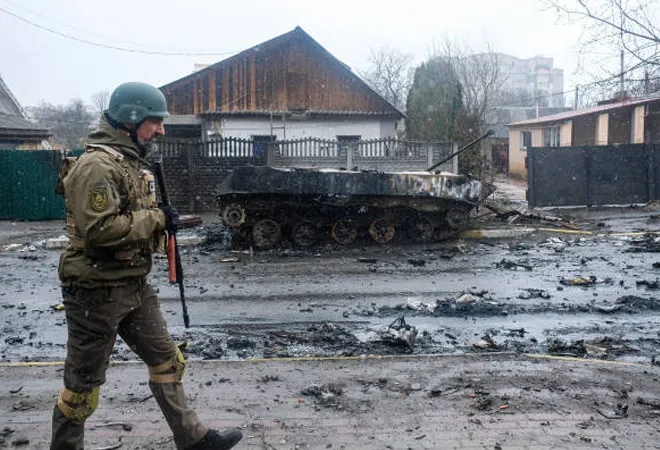The Indo-Pacific has gained a centrality in the strategic discourse like no other region. Both from an Indo-centric discourse as well as from the perspective of the global strategic outlook, the Indo-Pacific region is central to the balance of power in the Asian, and global, landscape. With the increasing involvement of external actors from the Euro-Atlantic world to balance a rising China, the region has rapidly gained global dimensions, bringing the intense attention of the major powers on this region. In addition, there is the increasing role of the middle and strong powers, with their own strategic outlooks, institutional strengthening, rising global trade and a shift of the global strategic anchor.
The ongoing Ukrainian crisis may seem too distant from an Indo-Pacific standpoint but the ripples from the Eurasian heartland are already impacting the politics and economics of this megaregion like never before. If the Russia-Ukraine war and its consequences are a microcosm of future geopolitics, there are three emerging trends that signal a causal nexus of the Indo-Pacific with the world.
For one, it signals a deeper and expansive connectivity of the Indo-Pacific with the geopolitics of the Euro-Atlantic. Second, the ongoing Russian war on Ukraine may have consolidated an unprecedented western economic response against Russia, with impending economic consequences for some Indo-Pacific nations, including India. And third, the West’s ability to unify a combined response to Russia signals that the neoliberal structures of the global economy and politics haven’t withered away and, from their viewpoint, the Indo-Pacific strategy will fundamentally be guided by its core principles.
The dramatic shift in the EU’s stand vis-à-vis Russia is going to have significant implications for the Indo-Pacific, especially in the light of European countries trying to increase their presence and strengthen their partnerships across the Indo-Pacific. All the three countries from Europe which have laid out their regional policies for the Indo-Pacific — France, Germany and the Netherlands — have taken a starkly opposing stance against Russia. Of them, Germany’s overnight march into a renewed phase of armament will reshape the security landscape of not just the EU but even the Indo-Pacific region.
The dramatic shift in the EU’s stand vis-à-vis Russia is going to have significant implications for the Indo-Pacific, especially in the light of European countries trying to increase their presence and strengthen their partnerships across the Indo-Pacific.
Russia’s war has also shown that the Indo-Pacific will remain central, in terms of the impact on this vast region of any turbulence or war almost anywhere in the world today. More importantly, the leading Indo-Pacific nations — most specifically the Quad nations — will be critical to how wars shape and end. Central to this is how the nations at the helm in the Indo-Pacific define their regional roles and responsibilities.
The conflict in Ukraine forced the Quad leaders to meet virtually on March 3 and take stock, reflecting that the basic consensus among the Quad countries about an enhanced global role may
well have become an agreed agenda. In the September 2021 meet, the Quad leaders for the first time included two important agendas that were seen as beyond their traditional policy realm:
denuclearisation of the Korean Peninsula and counterterrorism in Afghanistan. As successive meetings of the Quad leaders and foreign ministers have shown, there is an increasing connection
between the group’s increasing ambit of policy concerns and the changing balance of power in the Indo-Pacific.
The fact that the Quad members convened a meeting amidst the ongoing Ukraine crisis and specifically assessed its implications for the Indo-Pacific signals two important things: first, the
strategic geography of the Indo-Pacific is being increasingly tied to the rest of the world. Secondly, the Quad may be leading an integration of the Indo-Pacific with the larger paradigm of the global
It augurs well for India that while the Quad convened the meeting, no outstanding decision resulted from it. While the meeting itself signals a positive development for the Indo-Pacific strategy and the Quad’s growing role within it in stepping up to assess all important global events and crises, the lack of a joint statement against Russia evinces the complexities of the new multilateral order in the Indo-Pacific.
India’s pushback against pressure from the other Quad members to take an aligned stance, even when the interests of India stand in some contrast with that of the other members, may be good not just for India’s own interests but for the larger spatial democracy that an expanding Indo-Pacific seeks.
On Russia, India’s position certainly stands out from that of the other three Quad members — as does the reality of its entwined interests with Moscow. India’s pushback against pressure from the other Quad members to take an aligned stance, even when the interests of India stand in some contrast with that of the other members, may be good not just for India’s own interests but for the larger spatial democracy that an expanding Indo-Pacific seeks. With increasingly varied countries under the Indo-Pacific umbrella, a strict alignment of positions is increasingly difficult.
While India wards off western pressure on its stance on Russia, the Ukraine crisis could test the limits of the leeway one Quad country will have versus the others in the group. In the present case, the West, led by the US, may have been able to cut India some slack because of its military’s dependence on Russian supplies, which is seen as a necessity apropos China, and its unique humanitarian stakes due to the Indian students who were caught in the war zone as well as New Delhi’s own position outside the P5 of the UNSC. But with apparent signs that the US may be
leading a strategy to align the Indo-Pacific with the Euro-Atlantic, India’s Russia-related choices will have to be recalibrated. Though the West may “understand” India’s sue generis position vis-àvis Russia, its expansive sanctions on Russia and India’s desire for greater integration with the global economy are on collision course.
Geopolitically, the Ukraine crisis has pushed the extant world order to a brink. Irrespective of how it ends, it will necessitate recalibration by all major powers and economies, including India.
This commentary originally appeared in Deccan Herald.
The views expressed above belong to the author(s). ORF research and analyses now available on Telegram! Click here to access our curated content — blogs, longforms and interviews.




 PREV
PREV


